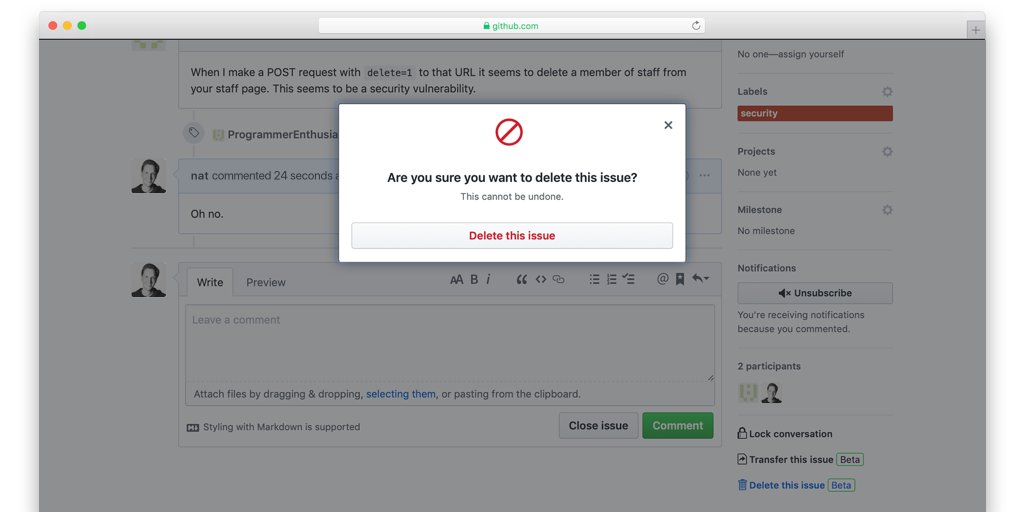Is it possible to completely remove an issue from the GitHub issue tracker?
Update Nov 2018: You now can delete issues if you are a owner of the repository!
See "Github - remove issues entered in error"
https://docs.github.com/en/github/managing-your-work-on-github/deleting-an-issue mentions:
People with admin permissions in a repository can permanently delete an issue from a repository.
For other people (without permission), questionto42's comment shows that you can ask to GitHub support for the issue to be deleted, as illustrated here.
At May 2018, original answer:
Three 8 years later, and closing issues remains the answer (still no deletion possible).
See "The Ghost of Issues Past", where GitHub advise to check and close:
- issues opened over a year ago
state:open created:<2013-01-01 - the ones I'm involved with
involves:twp state:open created:<2013-01-01 - and those not updated in the last year
involves:twp state:open updated:<2013-01-01
No, the github API only allows you to open/close/reopen issues. Here's the Issues API docs.
You can edit an existing issue (let's say if it's a duplicate) and you can change the title, description and target milestone to be something completely different. That's as close as you can get to removing the ticket, AFIK.
Update Nov 2018: You now can delete issues if you are a owner of the repository!
See "Github - remove issues entered in error"
https://docs.github.com/en/github/managing-your-work-on-github/deleting-an-issue mentions:
People with admin permissions in a repository can permanently delete an issue from a repository.
For other people (without permission), questionto42's comment shows that you can ask to GitHub support for the issue to be deleted, as illustrated here.
At May 2018, original answer:
Three 8 years later, and closing issues remains the answer (still no deletion possible).
See "The Ghost of Issues Past", where GitHub advise to check and close:
- issues opened over a year ago
state:open created:<2013-01-01 - the ones I'm involved with
involves:twp state:open created:<2013-01-01 - and those not updated in the last year
involves:twp state:open updated:<2013-01-01
For posterity: Deleting issues would be a bad thing, since in general they can be targets of associations on github.
But if you are willing to sacrifice the collaboration info, here is a "whack it with a sledgehammer" approach:
- Clone your original repo.
- Copy your issues via the Issues API.
- Delete the original repo; alternatively, chose a new name for your new repo.
- Re-create a new repo based on your clone.
- Re-create the issues you want to keep via the Issues API.
I imagine this could potentially lose a lot of other linking information as well such as forks, pull requests, etc.
Public feature request
I wrote to GitHub in 2014-08 and https://github.com/jdennes replied by email:
Thanks for the suggestion. It's only possible to edit/clear the issue content currently. However I've added a +1 to this suggestion on our internal Feature Request List.
confirming it was not possible.
Best workaround so far
set the title to something that will never conflict with any search, e.g. a single dot
..This may not hide the history of your blunder entirely because of the automatic undeletable "changed the title to" comments.
make the body empty
GitHub staff has the power
If something is a security issue, contact GitHub staff, they usually reply quickly, and are able to remove issues for good as can be seen at: http://archive.is/OfjVt which has issue 1 and 3 but no 2.
You can delete the entire repo if it's really important.
Possible workaround
As of 04/2019 not all issues can be deleted current work around is to edit the issue then delete the edit history, the only downside is that the issue still exist and the old title could be seen.

You could by just asking to github to ban the user that created the issue 😁
Source: https://github.com/isaacs/github/issues/253#issuecomment-290944938
Users are unable to do this, including repository owner.
But issues can be deleted by Github support. One may contact them and request deletion. It may be delayed or refused but it is an available option that can be used.
Still impossible. Another workaround to the ones suggested in the other answers is to label the issue as "deleted" (or any other label you might fancy better), to be able to filter them out if you use the github API to retrieve them. Obviously you should use that specific label only for this purpose, setting the label when you close the issue.
- You can create a new repository.
- Transfer (yeah it is possible) unwanted issues to the new repository.
- Then delete the new repository.
© 2022 - 2024 — McMap. All rights reserved.


"changed the title to"comments. – Uropygium